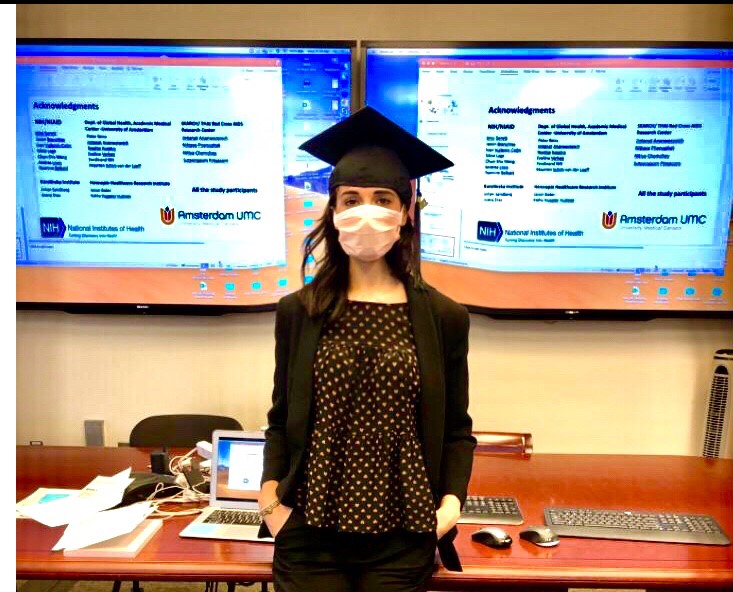
29 Jan Ornella Sortino awarded doctorate after successful PhD defense: “I would do it all over again!”
Although a big gathering in Amsterdam with people from all over the world was planned, Ornella Sortino defended her thesis online on the 20th of January 2021, in a room with colleagues of the National Institutes of Health (NIH) in Washington DC. Her thesis, entitled “The gut microbiome, mucosal immunity and disease pathogenesis in humans with HIV or idiopathic CD4 lymphocytopenia and in non-human primates with SIV”, explored changes in the composition of the gut bacterial communities and the mucosal immune cells in immunocompromised individuals. While effective antiretroviral therapy has contributed to the prolonged survival of people with HIV, they continue to experience higher rates of noncommunicable diseases (NCDs) compared to those living without HIV. It is hypothesized in the field of HIV research that the gut microbiome may contribute to this increase. While these bacteria in the gut are necessary to help us digest food and absorb energy, the gut microbiome is the main source of foreign microbes that we interact with during our lives. Could the bacteria that live in the gut microbiome increase susceptibility to NCDs?
Thanks to her promotors Prof. dr. Peter Reiss and Prof. Dr. Jintanat Ananworanich, Ornella had access to the AGEhIV Cohort. Using a subset of the AGEhIV Cohort, she explored how the gut microbiome is different in people with HIV, and the extent to which it may correlate with the increase in inflammatory diseases. Her research also dissects the differential impacts on the gut microbiota for two major sources of microbial heterogeneity: that of sexual practice and HIV infection status. Her research showed that men who have sex with men (MSM)-associated microbial signature is unique from that of HIV infection, and the taxa (microbial species) that constitute both the MSM and the HIV microbial signatures have a different species composition.
A born scientist
Doing a PhD was Ornella’s destiny. Following her bachelor’s in Biological Sciences at the University of Catania in Sicily, Italy, she continued with a master in Cellular and Molecular Biology at that same university. After graduation, Ornella moved to London to commence a PhD. Due to personal circumstances, she moved to the United States and stopped her PhD in London. Ornella started working for NIAID/NIH in 2014, whose director is Dr. Anthony Fauci. “The NIH is one of the greatest places to work as a scientist. NIH offers many resources, people, and network to do scientific research.” At the NIH, Ornella juggled between lab and clinical work in Dr. Irini Sereti’s team. Ornella’s gained experience in immunology at the NIH combined with her extensive knowledge in microbiology, made her the perfect candidate to study the gut microbiome in immunodeficient individuals. Thus, in 2016, a PhD position for Ornella came knocking at the door once again.
The beginning of her PhD was rather challenging. “Science is dynamic, it’s not a fixed set of facts”. The field of microbiome research has evolved rapidly in the past decade and with it the methods to investigate the gut microbiome. Thus, her ongoing projects often required revision and the application of new scientific techniques. During her PhD she had many international collaborations. “Science is a trial-and-error process where collaborations with other institutes are vital and provide opportunities to rapidly expand scientific knowledge”. Ornella mentions she was rather lucky in terms of her research when the COVID pandemic hit. Most of the research and lab work was completed so she could focus on writing. Ornella published approximately 10 papers as part of her PhD, five as first author. Her research represents a valuable contribution to the literature, and she is thankful for all the mentoring and collaboration she received. She thanks her promotors and her co-promotors, Dr. J. Brenchley, and Dr. N. Kootstra.
What’s next for Ornella?
During her research trajectory, Ornella grew both as a scientist and as a person. She had the unique opportunity to collaborate with many institutions internationally; “I’ve met such passionate people during this journey, all working toward a common goal of improving disease care and patient quality of life”. Ornella plans to move back to Europe and carry on investigating the mechanisms of gut microbes-mediated inflammation. She explains, “the study of the gut microbiome is complex but fascinating. The gut microbiome can be cause of disease but can also be manipulated as a treatment strategy”. All in all, Ornella cherishes her PhD journey, saying, “honestly, I would do it all over again with the same people, the same institutes, and in the exact same way. Perhaps I would live a little more calmly, though!”
A big congratulations on behalf of AIGHD for Ornella’s hard work. We wish her the best of luck in her future research, wherever this may be!
